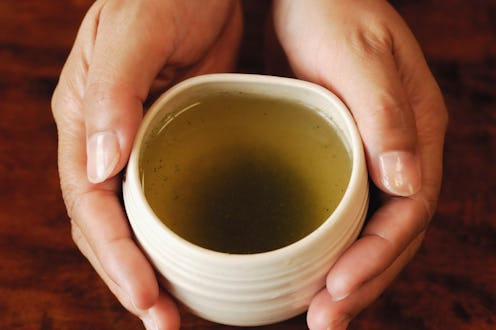Life
Your Green Tea May Come With This Major Health Benefit

While coffee might be the go-to morning beverage of choice for many, lots of us — myself included — really love us some tea. And now, there’s even more reason to sip on your daily cup of matcha (or three), according to new research, a compound found in green tea could help your heart in this seriously important way.
According to research published in the Journal of Biological Chemistry, scientists from the University of Leeds and Lancaster University have found that a compound found in green tea called EGCG — which is being studied for its potentially therapeutic benefits in treating Alzheimer’s disease — may also be capable of dissolving protein plaques that can contribute to heart attacks and strokes. According to the Guardian, EGCG can bind to a protein found in these disease- and heart attack-promoting plaques, helping to dissolve them and make them more soluble — making it much easier for the body to give these harmful substances the boot.
According to the Independent, researchers were studying the effects of this compound found in green tea for its ability to break up amyloid plaques in the brains of Alzheimer’s patients. But scientists now believe that this same compound also has positive effects on atherosclerosis, which happens when fatty plaque builds up in the lining of blood vessels — potentially leading to strokes and cardiovascular disease.
David Middleton, a professor of chemistry at Lancaster University, said in a press release that "The health benefits of green tea have been widely promoted and it has been known for some time that EGCG can alter the structures of amyloid plaques associated with Alzheimer's disease. Our results show that this intriguing compound might also be effective against the types of plaques which can cause heart attacks and strokes." The research team is now working to figure out how best to deliver therapeutic doses of this beneficial compound without patients having to drink a bazillion cups of tea per day.
Professor Jeremy Pearson, Associate Medical Director of the British Heart Foundation, was also quoted in the press release, saying, “our bodies are very good at breaking down EGCG so swapping your cuppa for green tea is unlikely to make a big difference with respect to your heart health.” But he further explained that new medicines could be developed by slightly engineering the beneficial green tea compound, and then administering it therapeutically via those medications. Modifying the chemical structure of EGCG might make the treatment process easier and more effective moving forward, and new methods of delivering the healing compound to disease-promoting plaques may include injection.
Lead study author Professor Sheena Radford, Director of the Astbury Centre for Structural Molecular Biology at the University of Leeds, said that “the findings of this round of studies are very encouraging. We now need to apply the best scientific techniques to find how we can take the molecular EGCG element from green tea, and turn it into a functioning tool to combat life-limiting health issues."
So while it definitely doesn’t hurt to drink your daily cup of green tea, researchers say that drinking normal quantities of it isn’t likely to deliver therapeutic doses of EGCG. Additionally, more research is needed to determine the best ways of delivering ECGC to the body, and how to most effectively introduce the green tea compound to harmful plaques. While researchers investigate new medications, though, you can definitely feel free to keep sipping on your matcha; green tea has numerous health benefits, according to WebMD — like being amazing for brain health and loaded with antioxidants — so keep enjoying your daily cup, y'all.